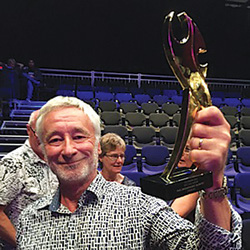Phil Broadhurst: A Tui For His Dedication
Phil Broadhurst: A Tui For His Dedication
Auckland based jazz pianist Phil Broadhurst won this year’s NZ Music Awards’ Jazz Tui for the third album in his loosely termed Dedication trilogy ‘Panacea’. NZM’s Aleisha Ward met with Broadhurst to discuss his win and what he’s up to next.
 The first two albums in Phil Broadhurst’s Dedication trilogy – ‘Delayed Reaction’ (2011) and ‘Flaubert’s Dance’ (2013) – were both nominated for Jazz Tuis. Winning the Tui this year, Broadhurst likens his win with ‘Panacea’ to Peter Jackson winning the Oscar for Lord of the Rings Part 3.
The first two albums in Phil Broadhurst’s Dedication trilogy – ‘Delayed Reaction’ (2011) and ‘Flaubert’s Dance’ (2013) – were both nominated for Jazz Tuis. Winning the Tui this year, Broadhurst likens his win with ‘Panacea’ to Peter Jackson winning the Oscar for Lord of the Rings Part 3.
“’Delayed Reaction’ lost out to Rodger Fox and ‘Flaubert’s Dance’ to Nathan Haines, so whether it was a vote bearing in mind that it was a trilogy and they [the judges] saved it until now, I don’t know,” he jokes.
The trilogy of albums dedicated to his influences, friends, and peers grew subconsciously at first.
“When we did ‘Delayed Reaction’ that was one of the things that resulted from my Masters’ research into [French jazz pianist] Michel Petrucciani. It wasn’t until afterwards that I realised that it was a sort of dedication to him, and when it came to the next album, I thought, why not do a dedication to a number of musicians, so the trilogy kind of grew from there.
“As well as being dedicated to some famous musicians, such as Horace Silver ‘Panacea’ is also dedicated to some of the players that I’ve been closely involved with, like [guitarist] Martin Winch, so that title track is dedicated to him. I used to have a band with Martin and Kim Paterson in the 1970s and we called the band Panacea, but there was never a song called Panacea until now.”
In addition to being an active performer Broadhurst is also a lecturer at the Massey Albany jazz programme and host of the long running (23 years) radio show The Art of Jazz, on Radio NZ Concert. As such he has a unique overview of jazz here.
“The state of jazz in NZ is that it comes and goes, and it’s invariably hard to pin down exactly what’s going to happen in the future. I think as far as Auckland is concerned, one of the improvements over the last few years has been the development of the CJC [Creative Jazz Club]. It enabled more interaction between Wellington and Auckland, and even Christchurch and Auckland, especially with the emerging artists series. This is something you don’t really get very much in any city. I’ve been back and forth between Wellington and Auckland a lot and I can tell you that no one in either city has much of a clue about what’s going on in the other, so having a place that encourages musicians from other cities to come and play, is really important.”
However, while creative aspects of the jazz scene are improving, the financial aspects are not.
“We’re working for less now that we did 20 years ago, which is crazy… the trouble is that we end up agreeing to it anyway just for a chance to play. That’s the other problem, we all enjoy it too much so we don’t worry as much as we should about the money. We’re by no means unique in this in NZ though – it happens everywhere.”
Keeping venues going is another issue he identifies as challenging the local jazz scene.
“It’s no good having a whole bunch of student musicians playing on the street, you need the venues. And if the venues are only concerned about making money on the bar, then in the end you’re going to have a problem. Jazz audiences now are there to listen to the music, rather than drink, and that’s a huge change. We didn’t used to have that, even 10 years ago, but we’ve got it now… because you’re often paying money to get in, so why wouldn’t you listen?
“Maybe the answer is to go even further. The CJC experimented recently with having two distinct sets, so maybe we need to move to the New York style with multiple sets per night, and have a drinks minimum, and then you satisfy the bar staff more.”
Because his Dedication trilogy spanned several years Broadhurst says he’s looking at different possible directions to take.
“I’m going to try and do something with Julie [Mason]. I’ll write some music, she’ll write some lyrics and we’ll do some vocal stuff. We’re going to Europe next year, possibly for a year since my job at Massey is winding up at the end of this year. We might line up some gigs while we’re there. If the radio show continues, I might also do that from there as well.”
